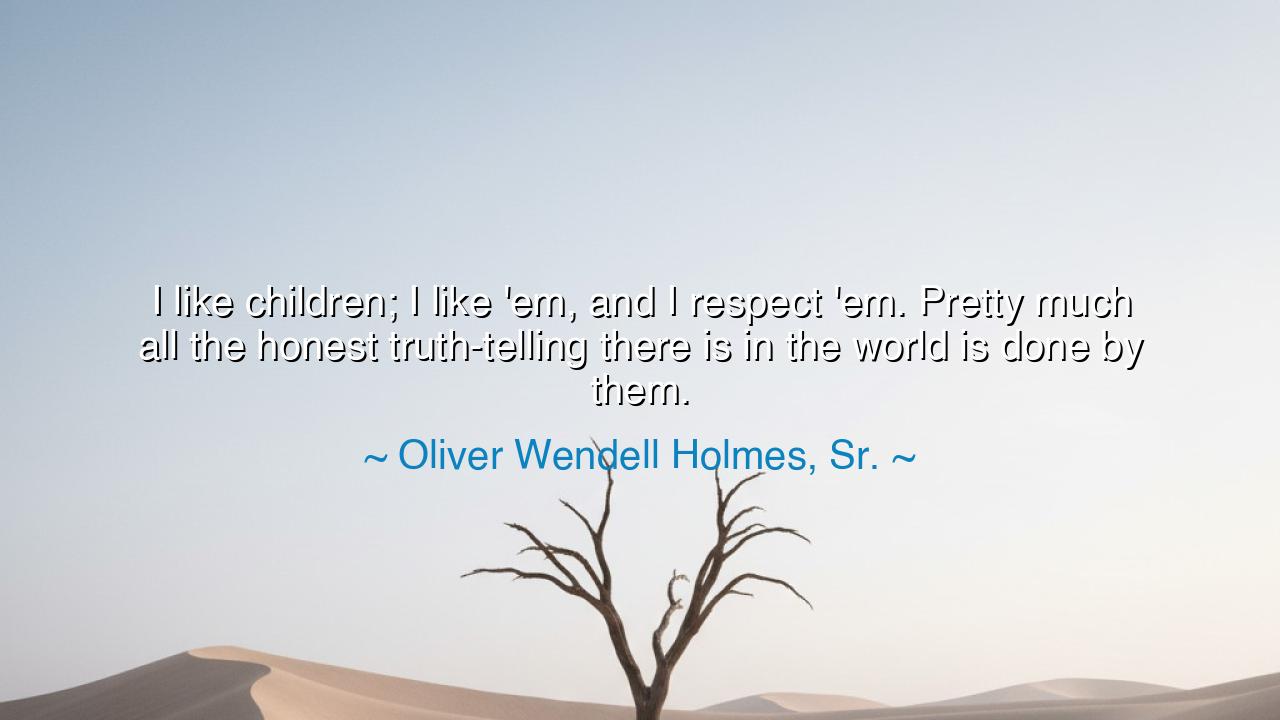
I like children; I like 'em, and I respect 'em. Pretty much all
I like children; I like 'em, and I respect 'em. Pretty much all the honest truth-telling there is in the world is done by them.






Hear, O lovers of wisdom and innocence, the words of Oliver Wendell Holmes, Sr., who declared: “I like children; I like ’em, and I respect ’em. Pretty much all the honest truth-telling there is in the world is done by them.” These words carry with them not only affection for the young, but a deep reverence for the clarity and candor that only children bring. In their simplicity lies purity, in their directness lies wisdom, and in their unguarded honesty lies a mirror in which the world may see itself more truly than in the speeches of kings or the judgments of scholars.
The origin of this saying rests in Holmes’ own life as a physician, poet, and thinker in the 19th century. He observed both the frailties and pretenses of adults—how society cloaked itself in layers of formality, deceit, and ambition. Yet in contrast, he saw children, unspoiled by these burdens, speaking with the kind of blunt truth that adults often fear to utter. To Holmes, this was not merely endearing but worthy of respect, for it reminded humanity of a virtue long buried beneath the masks of civilization.
To say that children are the great truth-tellers is to recognize their innocence. They have not yet learned the art of disguise, nor the cunning of half-truths. A child sees hunger, joy, sorrow, or injustice, and names it plainly. This raw honesty can pierce through hypocrisy as a blade cuts through cloth. Where adults weave elaborate excuses, the child says simply: “That is wrong.” Where grown men flatter, the child laughs; where women remain silent to spare feelings, the child asks the unthinkable question. In this way, children keep alive the flame of authenticity that the world so often seeks to smother.
History itself bears witness to this truth. Recall the tale of Hans Christian Andersen’s fable, The Emperor’s New Clothes. It was not courtiers, scholars, or priests who dared reveal the monarch’s folly, but a child who cried out, “The emperor has no clothes!” In that moment, the illusion of grandeur was destroyed by the clarity of innocence. The story is not fiction alone—it is a parable for the power of children’s honesty, and for the blindness of adults who forget how to speak plain truth.
Holmes’ words also remind us that to respect children is to honor their perspective, not dismiss it. Too often, society belittles the voices of the young, treating them as incomplete or unworthy of attention. Yet wisdom demands the opposite: to listen attentively, to recognize the flashes of insight that spring from their unguarded minds, and to let their honesty humble us. For the teacher may instruct, but sometimes it is the child who reveals the deeper lesson.
The deeper meaning of this saying is both comforting and convicting. Comforting, because it assures us that truth is never lost while children walk among us; convicting, because it calls us to recover in ourselves the same courage to speak plainly. Holmes did not merely delight in children—he held them as examples. He points to them as guardians of sincerity in a world so quick to trade truth for convenience, or honesty for reputation.
The lesson, O listeners, is this: cherish the honesty of children, and seek to imitate it. Do not train them out of their candor with scorn, nor silence their truth with dismissal. Instead, let their innocence remind you of what is noble in your own soul. Speak more plainly. Live more truthfully. Respect those who dare to tell you what you do not wish to hear, for in their courage lies your salvation.
Thus let Holmes’ words endure: “Pretty much all the honest truth-telling there is in the world is done by them.” Remember it, and hold fast to it. For in a world grown weary with deception, it is the child’s voice that calls us back to honesty, humility, and the freedom of truth.






AAdministratorAdministrator
Welcome, honored guests. Please leave a comment, we will respond soon